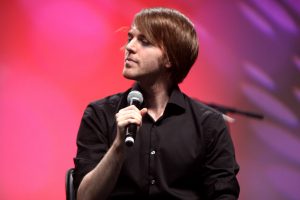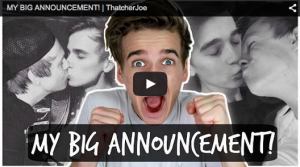Participatory culture has become an integral aspect of web 2.0, as there are various platforms for users to create their own content and establish themselves as an online brand. There are many ways an individual can utilise the Internet for their own personal benefit, some people even become self-employed as a result of the success and how recognisable their work becomes. The arts and entertainment field itself is popular online, and many people use the Internet as a platform to upload their work.
Journalism is an extremely popular component of web 2.0. The news itself is established as journalism – an ongoing theme throughout my posts has been how the Internet and social media are ubiquitous in terms of allowing users to instantly and consistently keep up to date with the news. However, there is a new rise of entertainment that is currently ‘on-trend’, especially amongst the ‘millennial’ generation: ‘Vlogging’.

The phenomenon of Vlogging
‘Vlogging’ has been made popular due to the video-sharing phenomenon, YouTube. Individuals utilise the platform by uploading content to the ‘blogosphere’ (though in this case it would be referred to as ‘vlogosphere’) and reaching substantial audiences due to the popularity of YouTube. Some of the most popular ‘vloggers’ have gained up to 5 million subscribers, with channels such as ‘BFvGF’ gaining over 2,000 followers a day.
A number of YouTube personalities have also branded themselves on their sexuality, and use it as principle talk about their life experiences as an LGBT person (though this is not what defines them, and there is bound to be content on other subjects). YouTubers such as Tyler Oakley, Shane Dawson and Joey Graceffa are incredibly popular ‘vloggers’, and have created many videos raising awareness to LGBTQ+ culture.

Viral star Brendan Jordan prolonged his stardom by creating a YouTube account. The fact that other users can comment, like and subscribe to videos enforces a sense of ‘global unification’. Messages can vary in support or disdain of the YouTuber, though this is inevitable throughout any YouTube channel with a substantial following due to the ‘troll’ affect. Jordan in particular has used his online presence as a platform to be invited to attend corporate organisations like The Human Rights Campaign to discuss LGBTQ+ issues, and brand himself as a gay rights ambassador –modelling for gay-friendly companies such as American Apparel, and making further appearances on television.
Vlogging as a community
YouTube is also a community for LGBTQ+ groups. However, sometimes there are interesting and questionable approaches in regard to the content that is uploaded. For example, ‘The Johnlock Conspiracy’ is a fandom that believes that the two main characters of BBC’s Sherlock, Dr. John Watson and Mr. Sherlock Holmes, are in love with each other. Although this is contrary to the plot, content is upload to YouTube (among other online media outlets) that details the complexity of Steven Moffat and Mark Gatiss’ story-telling through dialogue and symbolism. In fact, the group used their recognition and platform to campaign for more diversity and LGBTQ representation within the TV and film industry.
Celebrities using YouTube as platform
World-famous LGBTQ+ stars also use YouTube to disseminate their work to people on a global scale. The Ellen DeGeneres Show airs in the USA, but has become increasingly popular all around the world due to its YouTube channel. Short clips are uploaded and reach up to millions of views due to Ellen’s stardom and celebrity status. A relevant example is her interview with a survivor of the Orlando shooting, which also saw Katy Perry make a guest appearance – It has now almost reached 3.5 million views.
Queer culture has increasingly become popular within society, and some YouTubers and celebrities have been accused of ‘queerbaiting’ by attempting to attract fans by luring them into thinking that they are gay. They use titles such as ‘Coming Out Story’, or ‘My Secret’ as clickbait, knowing that a significant portion of their followers believe that this will be LGBTQ+ related. Coming out videos are extremely popular on YouTube, and this immediately hooks a target audience that is primarily liberal. However, the backlash produces a false sense of assurance, and is becoming an issue on YouTube.

To conclude,
YouTube has created its own form of celebrity through ‘vlogging’, and is a LGBTQ-friendly company that allows individuals to upload messages of love and pride. The LGBTQ phenomenon is becoming a key theme through social media. There are many LGBTQ+ vloggers who are popular with audiences, they let viewers into their lives and ultimately gain respect by doing so. It promotes a sense of equality among the heteronormative lifestyle we are so used to, as well as informing the public on topics in regard to the true definition of gender – like how there is so much more beyond the gender spectrum (gender-fluid, non-binary, agender, just to name a few), and the promotion of trans rights through YouTubers such as GigiGorgeous.